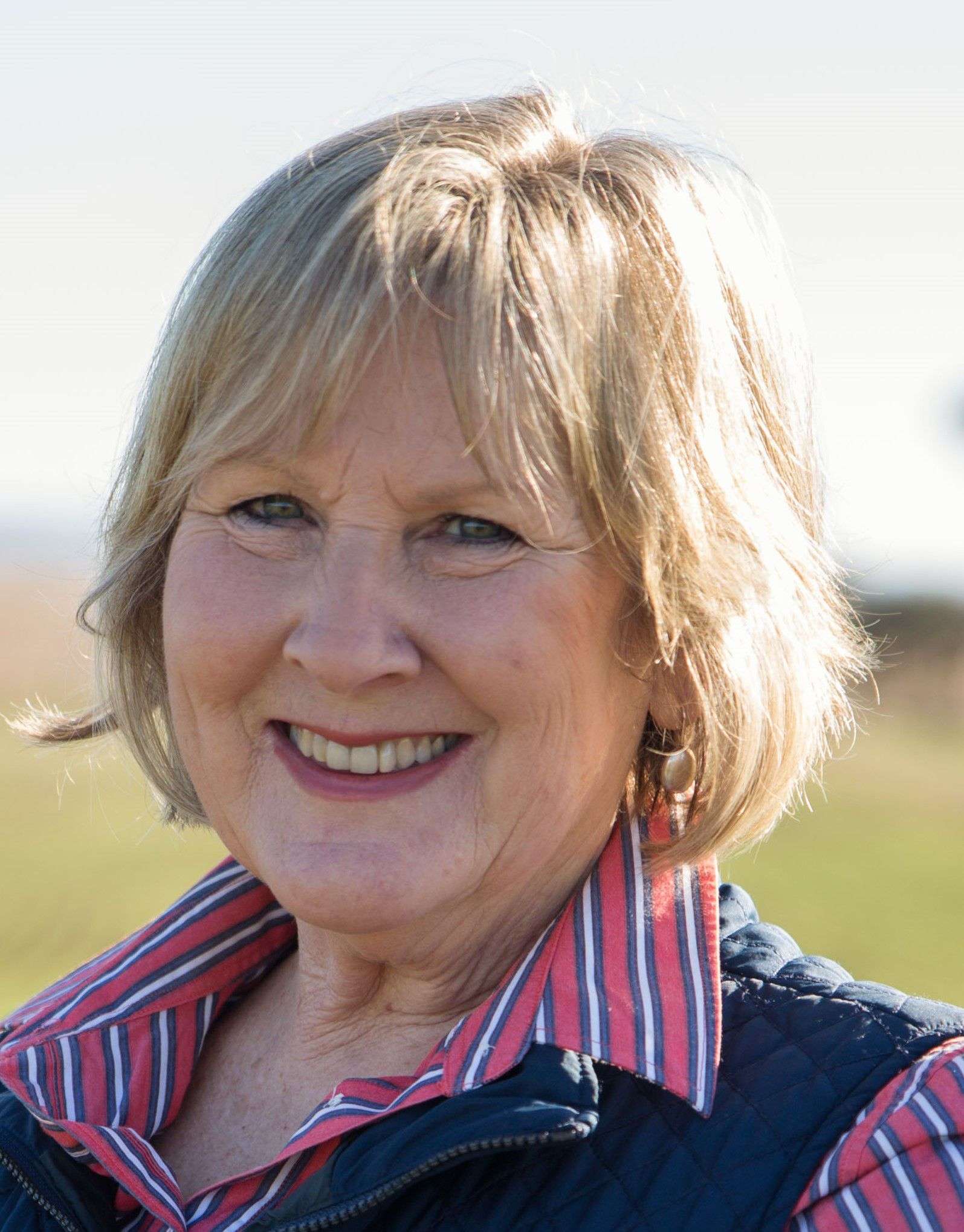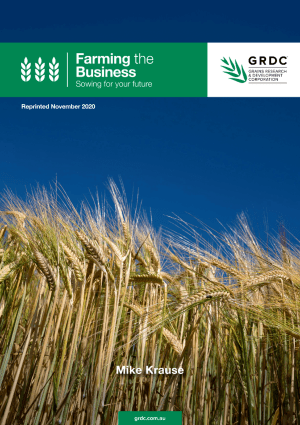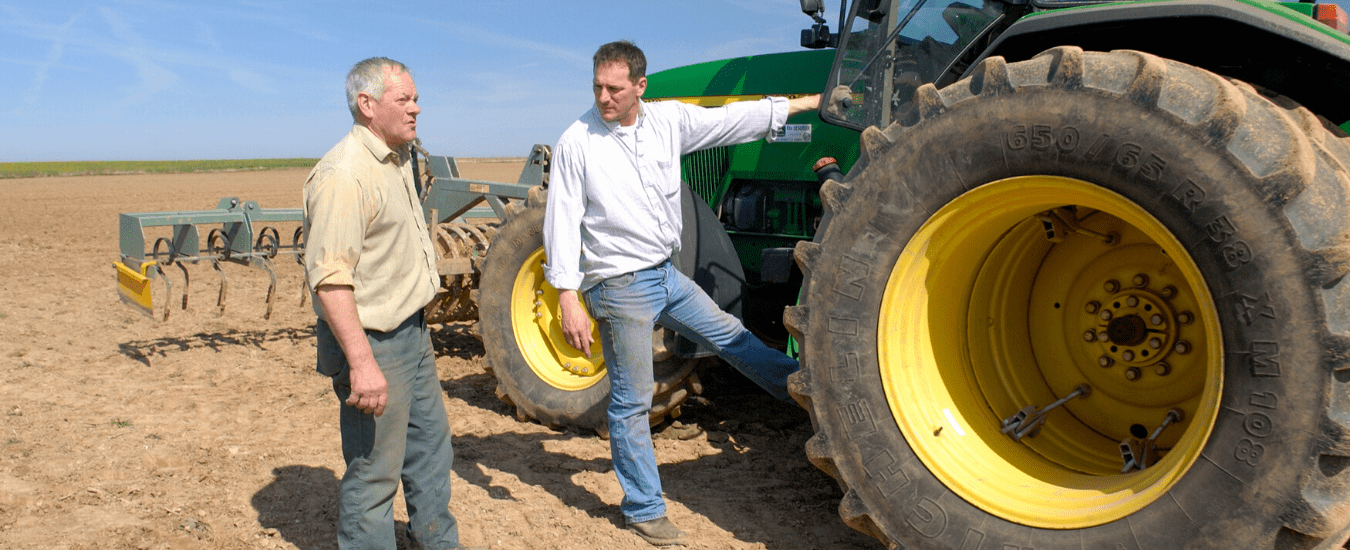
In this third podcast on farm succession planning, Judy Wilkinson and Mike Krause discuss what things you can avoid in order to make this a successful process. Instead of being deterred by some of the negative stories out there, use this as motivation to follow the right process and take the necessary steps to achieve an outcome that is acceptable to all those involved.
Transcript: Podcast 3 with Judy Wilkinson
Mike Krause:
Welcome, Judy, to our third podcast on succession planning. Judy, in our first two podcasts, we discussed why it's important to get started and what a good succession planning process should include. In this, our last podcast. I wanted to explore how some of the negative stories that are out there about poor succession planning outcomes should not deter people from actually doing it. Rather, they demonstrate how critical it is to follow an effective process and should be motivational for what to avoid. What's your take on this, Judy?
Judy Wilkinson:
Well, I agree with you, Mike. I think we're all too willing to share things that haven't gone well. In communities, we can watch it happening over the fence, or we can watch it happening down the road. We can see where some fellow has worked all his life on the farm, only to find out that in the end, the sisters are going to get as much as he's got. And so that can be, in social and community circles, can be looked at as being quite horrific or quite terrible and be talked up. And so we kind of hide behind that going, ‘Oh gosh this is awful!’ We wouldn't want that to happen, but what do we do to do things differently? I think also we don't always know exactly what's going on in that family. We don't exactly know what the background has been.
So we should be quite careful about how we judge it as well. And I'm thinking of a case where I went in to do a family meeting and the end result about 18 months later was that it was the whole thing was sold and everybody got out of farming. Everybody went their own way and it looked disastrous, but it actually was what had to happen.
Mike Krause:
Okay.
Judy Wilkinson:
So to me, it wasn't a terrible outcome. It was what is.
So the situation was that you had to accept what was going on and decisions had to be made around that. And the outcome was only this one outcome and everyone agreed to it. So it could have looked disastrous, but what it was what had to happen.
Mike Krause:
Well, I guess if everyone agreed to it, but you wouldn't necessarily know that from the outside, neither from the other side of the fence. So, that was a good result.
Judy Wilkinson:
And often you hear one member of the family whinge about what's happened. Yes, you don't always get the whole story. One of the things I do think you have to think about though in the situation is what is best for everyone. There might be situations, say where there is a father and son that are loggerheads and it's not going well. And it doesn't look like it ever can go well. So there has to be a decision made about whether you stay. I have a little rhyme for this. ‘You put up and shut up or you piss off’.
So let's explore that a little bit. So you've got to recognize what is, if it is, or it could be two brothers, not a father and son. It could be that you are never going to get on. It's not going to work well, someone is going to be upset or cross all of their life.
And someone else is going to be thinking he's doing more than the other. So you've got to accept the ‘what is’ situation and make a decision around that. Now, the reason that you would put up and stay is because you've got too much at stake, but you must work on how you are going to stay without become bitter and twisted, like a ‘whinging jackaroo’ in your forties. You want to make sure you can manage the situation and that you are not giving up your mental health for this.
Also, there might be a lot at stake. So if you hang around long enough you'll be okay, but certainly don't whinge or grizzle about it. You've got to make an environment where you're going to get on. And the other thing is you could decide to go. You could say, well, this is no good for me. I've got to go.
Mike Krause:
It's not worth it.
Judy Wilkinson:
And leave. In some cases, I have seen young people put together proposals to say, look, I've got to go because I can't stay. And then you find dad saying, well, gosh, I can't do it on my own. And I'll say, oh!
Mike Krause:
Oh, I am needed, am I? I didn't think I was needed.
Judy Wilkinson:
If you're going to make that threat, if you're going to say like, I'm going to go, you've got to be prepared to go. You've got to be prepared to follow through.
And I've seen that happen. And then I've seen somebody come back and ask them to return. But while you are sitting on the outside, while you're out there in no man's land, make the arrangements or have the discussion about how you are prepared to go back.
Mike Krause:
Right? Okay.
Judy Wilkinson:
Don't do it while you're in there. Don't try and whinge about it when you get back there. Make those decisions of how you're going to make this work or how you want it to work before you go back in. And I've done a few meetings like that too, where someone has left and then they've decided, oh gosh, we can't manage without them, so let's ask them to come back. And the arrangements have been quite different - there's been money sorted out, housing sorted out, remuneration.
Mike Krause:
And so a lot of issues were actually worked through. I remember having mum and dad decide that we want the sons to work together because that's what we think the economic unit was going to be. And the sons were forced into that for a period of time.
Mike Krause:
And then I came in and we looked at, what if we did split the business up? Do we have two viable businesses? And I did the modeling and as it turned out, we did. And so against mum and dad's will, the sons did divide and that saved their mental health. It gave them separate destinies, which they wanted to have, and still in the end of the day, mum and dad still have the family name in the district they still farm.
Judy Wilkinson:
Yes, I've done some similar ones where we have started out at the beginning with the intent that we were split in five years or 10 years. Interestingly, one of those that I've done are still working together because of economies of scale. They've got different enterprises. So, there are lots of successes which may look a bit ordinary to start with, but end up being what should happen, really. Because like we talked about, there used to be a saying about leaving your farm to your children was like child abuse, but it could be like leaving two brothers to work together who are incredibly different personalities. And...
Mike Krause:
And that could be child abuse.
Judy Wilkinson:
Sometimes there's generational differences. If you've got a child who's six or eight years older than another child, there is nearly a whole generation. Today, nearly a whole generation of different attitudes and different needs and wants and different expectations around that. So to be forcing them to work together could be like you say, driving a nail between them, really.
Mike Krause:
So I guess my feeling is that we talk through these things, we identify what the issues are and what the needs are. And if we keep talking, we'll actually find strategies that could be implemented that we hope do come to fruition.
Judy Wilkinson:
Yes.
Mike Krause:
And it's really that talking through and also doing the financial analysis to see what is possible.
Judy Wilkinson:
And definitely that's got to be a consideration, like the capacity of the business, the capability and the financial set up. It's difficult because when farming gets droughts chucked at it, like it does in the last couple of years, it does make things pretty tight and pretty ordinary. The other thing too, I guess I'd like to just mention, I don't know whether it's a case study, but it's certainly around making sure that succession really has to consider the generations before.
Judy Wilkinson:
When I go in to do a meeting, I think I'm sitting there with all these people with relationships with one another, but there's another relationship that's not even in the room. And it's the relationship with the land. This has really strong impacts on lots of people, even people who are off farm, who aren't working the farm. There's this relationship about this property or this place or this home, which you can't brush under the carpet. You've got to address it and talk about it and work out where it fits with everyone.
Judy Wilkinson:
The other thing is, sometimes these farms have come down a couple of generations, so we're not just answering to ourselves in the room, but to the people who have pioneered it, who've worked hard and have got you to the position that you might be in.
Mike Krause:
Yeah.
Judy Wilkinson:
Where there's thousands of acres instead of hundreds of acres. So one of the things I say is that you must do something about your parents. You must make sure you take care of them because what you want to do ultimately is settle them somewhere where they're happy and they're content, they've got their life to live and then you get to have your chance. So don't be in a rush to get rid of them and make sure that it's done properly.
And I have this little theory about this, is that they need somewhere to live that's independent of farming and farming income that is either paid for or paid for by something else. But it's got to be there so that it's not impacted by drought, down-turn and bad decisions.
Mike Krause:
Yeah.
Judy Wilkinson:
The same with the money. There must be some money that's isolated for them to use, that again is not impacted by a rubbish crop this year… they feel guilty about you doing it tough, so therefore they don't spend.
Mike Krause:
So they go without and things like that.
Judy Wilkinson:
Yes. So it's got to be that, that's theirs and you are not allowed to mess with that. You can't come back and want it. And also, they need something to do.
Mike Krause:
Yeah. and that's probably their responsibility too, to say, look, I do want to go fishing or I do want to go travelling or I do want to do this. And everyone should know what that purpose is.
Judy Wilkinson:
Yeah. It would be great if it was that simple, but that's three things you can think about.
Mike Krause:
That's why it takes a bit of time to work through these things. And you can't expect to get this solved in one day.
Judy Wilkinson:
No.
Mike Krause:
Or one meeting.
Judy Wilkinson:
Because interestingly, what happens is when you ask the parents, she wants to go to the beach and he doesn't want to go anywhere!
Mike Krause:
He wants to stay on the farm…I still want to be there. So yeah.
Judy Wilkinson:
So, we have to accept ‘what is’, that's the difficult bit. This is the situation we're in. These are the facts. This is what's real. This is what we have to deal with.
Mike Krause:
And let's look at the opportunity within that. Not the barriers but the change to happen. So...
Judy Wilkinson:
Yes.
Mike Krause:
On that note, Judy, thank you very much. I've really enjoyed our chat and I just hope our listeners out there have also got value out of it because it is a difficult issue and a difficult thing that we continue to grapple within the rural community. So thank you very much, Judy.
Judy Wilkinson:
Thank you very much for the opportunity Mike. It's been a pleasure.
Mike Krause:
Thank you Judy for these many insights.
I think there are five take home messages from this last discussion.
1. Look for solutions that are best for everyone.
2. You can decide to leave.
3. You may be able to split and create two viable farming businesses, but do the financial modeling.
4. Understand the family history and everyone's connection to the land. And,
5. Take care of mum and dad so that they can be financially independent, especially in times of drought and that they have something to do.
Mike Krause is one of Australia’s leading Farm Business Management consultants with significant experience in providing farm business management support, training and consulting to Australia’s agricultural and agri-business industries.

This experience forms the basis of significant developments:
‘Farming the Business’ manual Mike produced for the GRDC.
‘Plan to Profit’, the successful desktop software developed and sold by Mike over 12 years.
P2PAgri, our new online platform for farmers and advisers. Check it out on www.p2pagri.com.au.


Leave A Comment
You must be logged in to post a comment.